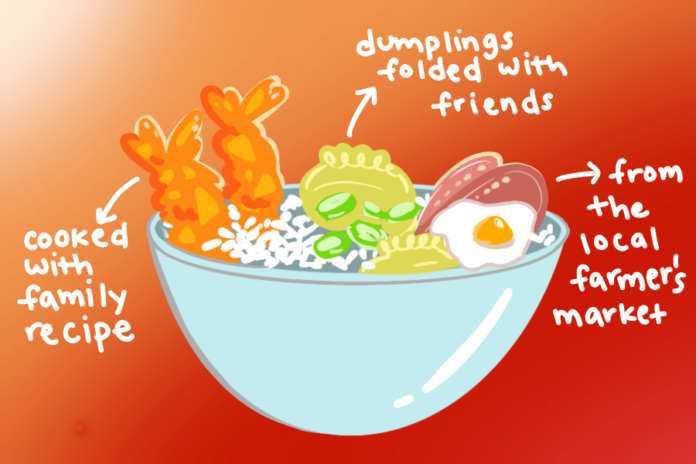Eating healthy and sharing food with family and friends can help boost physical and emotional well-being
By MAYA KORNYEYEVA — mkornyeyeva@ucdavis.edu
Most of the time, we don’t think about what we eat. Sure, we often try to figure out a balanced diet, or at least fight impulses to go to In-N-Out every couple of days. But a majority of the time, we just scarf down a granola bar before heading to our 9 a.m. class and then heat up some water for a ramen packet for dinner.
I know that, as a college student, time is always in short supply, and spending it eating can feel like a waste when there’s a mountain of work to get through before midnight. Then again, money is also in short supply, and rationing out what to spend on a good meal versus on affording your rent can be just as stressful.
All that being said, I am in favor of eating good food with good friends. Hear me out.
Historically, food has been tied with social tradition and creative expression. In fact, “food culture” — defined as practices, beliefs and attitudes associated with creating and eating food — is a part of every country around the globe.
For instance, I grew up eating the traditional recipe for borscht, a Ukrainian beetroot soup that my family would often share with other Ukrainian families in our area as a sign of kinship and bonding. Dim sum, originally from China, is another example of food tied to culture, as it is specifically served as an assortment of small Cantonese dishes that are shared with a large group of people in a social event that can last for several hours. Finally, Turkish coffee is an example of a special brewing tradition that creates a thick coffee from super fine grounds and is made in a group setting where people can sip the coffee and tell stories.
In this way, food has always been a means of expression, social bonding and communication. It is no secret that food makes people happy — eating healthy, nutritious food and, most importantly, sharing it with others, has been proven to promote feelings of well-being and belonging.
I, for one, always feel proud of taking care of my body when eating a good bowl of brown rice, bok choy, pork, green onion and a fried egg. By putting healthy food into my body, I ensure that I am setting myself up for success. This, in turn, boosts my self-esteem and sense of accomplishment.
Besides nutritious food acting as a foundation for our physical well-being, it can also be a source for psychological health. In fact, research from the University of Oxford has shown that the more we share food with others — whether it’s a simple boba date with your roommates or a family dinner — the more likely we are to feel satisfied and content with our lives.
Food is also associated with identity: how many of your memories can you recall right now that contain food? Moments are created around food; from memories of childhood to memories of individual people and places, food is a sensory experience that we can capture not just through our eyes but also our senses of touch, smell and taste.
With all of this in mind, I encourage you to put more consideration into food as a significant factor of your life. Cook and share meals with friends, go out to eat nutritious food and reconnect with your family by trying out some traditional recipes. Remember that food isn’t just something that we need to put into our bodies to survive: it can also be an emotional experience that connects your mind, body and soul.
Written by: Maya Kornyeyeva — mkornyeyeva@ucdavis.edu
Disclaimer: The views and opinions expressed by individual columnists belong to the columnists alone and do not necessarily indicate the views and opinions held by The California Aggie.





